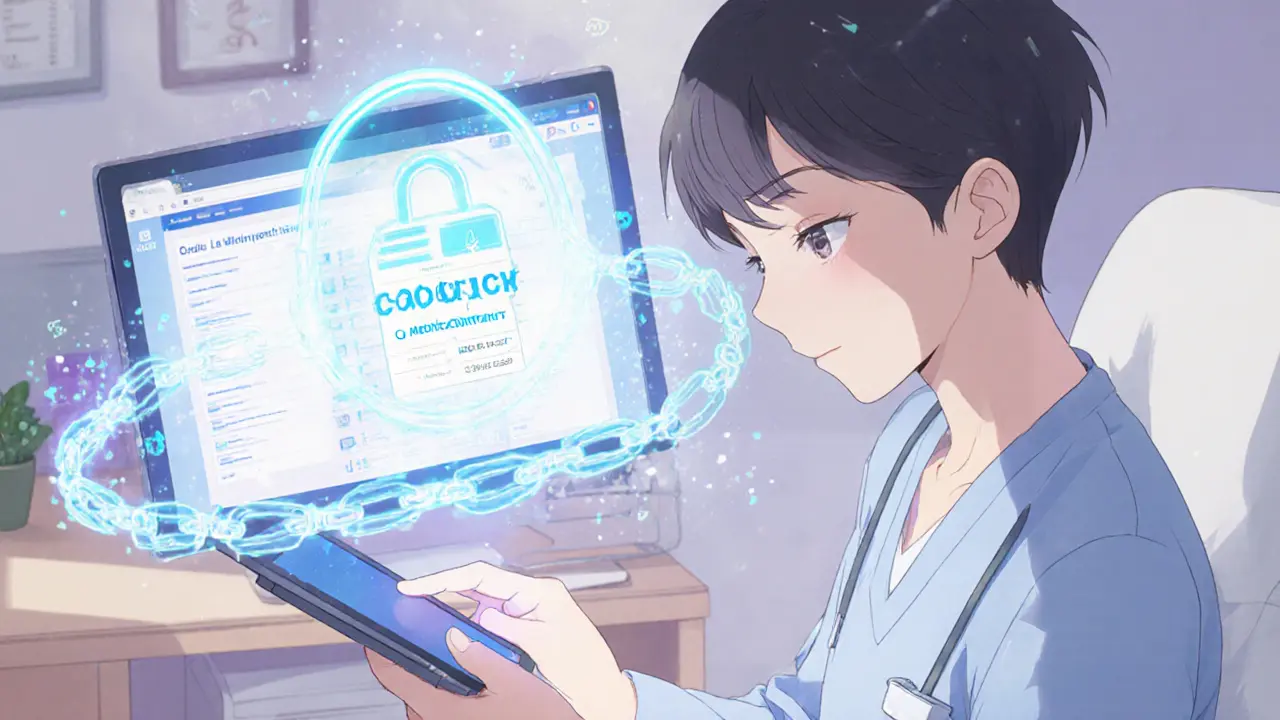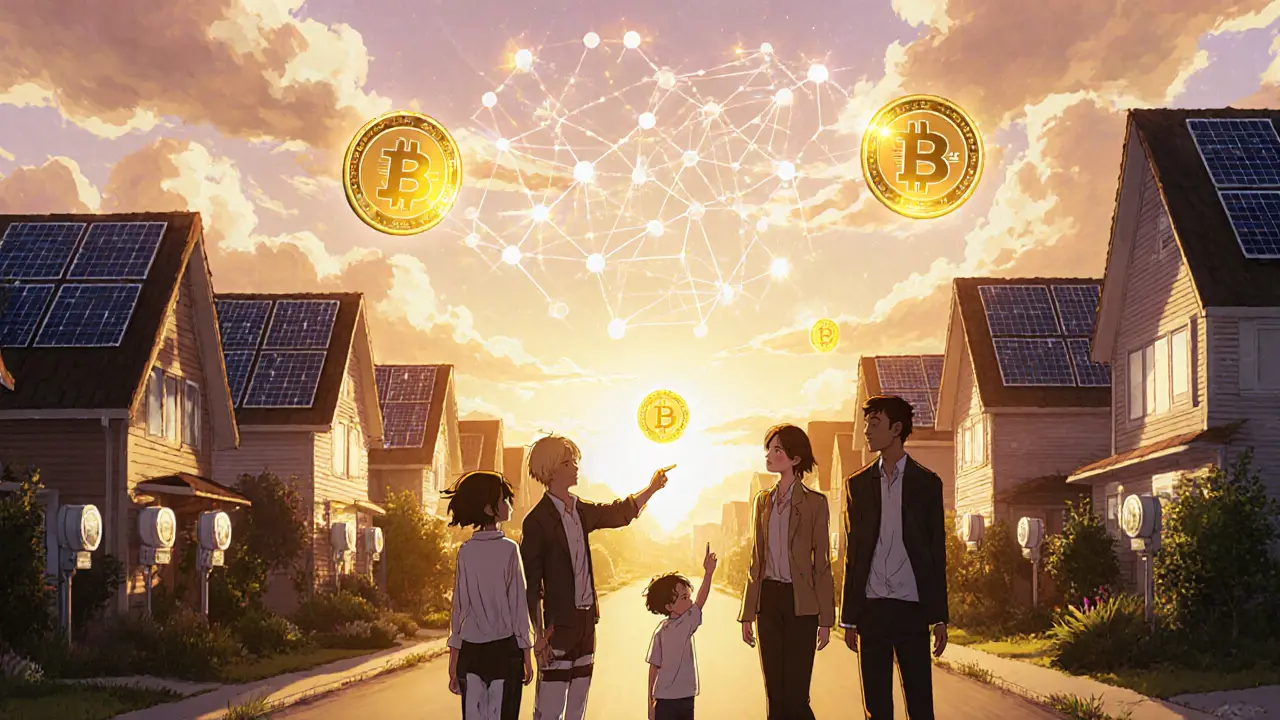Energy Trading Evaluator
Calculate your potential earnings from selling excess solar energy through blockchain-based peer-to-peer trading. The Brooklyn LO3 Energy project demonstrates how homeowners trade solar power directly with neighbors.
Estimated Earnings: $0.00
Calculated using current market rates
Blockchain isn’t just about Bitcoin anymore. Since 2008, it’s grown into something far more practical - a tool that’s quietly fixing real problems in industries most people interact with every day. You don’t need to own crypto to benefit from blockchain. It’s already in your food, your medical records, your voting system, and even how you stream music.
Tracking Your Food from Farm to Table
Ever wonder where your spinach came from? Or if that salmon at the grocery store was actually caught sustainably? Blockchain makes this answer instant. Companies like Walmart and IBM Food Trust use blockchain to track food through every step of the supply chain. If there’s a contamination outbreak, instead of recalling entire batches across continents, they can pinpoint exactly which farm, which truck, which warehouse was involved - in seconds. That’s a game-changer for food safety. Before blockchain, tracing a single contaminated product could take days or weeks. Now, it’s under two seconds. VeChain and Provenance do the same for coffee, diamonds, and luxury goods, cutting down fake products and helping consumers make ethical choices.Your Medical Records, Controlled by You
Your health data shouldn’t be stuck in a hospital’s outdated system, shared only when you’re physically there. Blockchain gives patients control. Platforms like Medicalchain let you store your medical history on a secure, encrypted ledger. When you visit a new doctor, you can grant them temporary access - no forms, no faxes, no waiting. Insurance claims get processed faster because the data is verified and tamper-proof. Hospitals reduce errors, patients avoid duplicate tests, and your privacy stays intact. This isn’t theoretical - clinics in Europe and Asia are already using it to handle millions of records securely.Proving Who You Are - Without a Passport
Losing your ID? Waiting weeks for a new birth certificate? Blockchain lets you own your digital identity. Estonia has been doing this since 2014 - citizens use blockchain-backed digital IDs to vote, sign contracts, and access healthcare online. India’s Aadhaar system uses blockchain to verify identities without storing sensitive data centrally. SelfKey and similar platforms let you prove you’re you - for banking, renting an apartment, or opening a business - without handing over your entire personal file. No more sharing your Social Security number with every service provider. You control what’s shared, when, and with whom.Buying a House Without the Paperwork
Real estate is slow. Too slow. Title searches, notary visits, escrow delays - it’s a mess. Tokenization changes that. Platforms like RealT let you buy fractions of a property - think $50 shares in a rental apartment in Texas. Ownership is recorded on blockchain, so transfers happen in minutes, not months. No more forged deeds or disputed titles. Every transaction is public, permanent, and verifiable. This isn’t just for investors. It’s opening up real estate to people who couldn’t afford a whole house before. The same system applies to land registries in places like Georgia and Sweden, where property records are now on blockchain to prevent fraud and speed up sales.
Insurance That Actually Pays Out
Insurance claims take forever. Why? Because they rely on paperwork, phone calls, and middlemen. Blockchain fixes that with smart contracts. Imagine your flight gets delayed. Your travel insurance automatically pays you because the system checks the airline’s flight data on the blockchain. No claim form. No arguing. Just code that executes when conditions are met. Companies like AXA and Allianz use this for flight delay insurance. In health insurance, claims are verified instantly against your medical records. Fraud drops sharply because fake claims can’t be altered on the ledger. This isn’t the future - it’s happening now in Europe and Southeast Asia.Artists Get Paid, Every Time
Musicians, photographers, and game designers lose millions to piracy. Blockchain solves it with NFTs and smart contracts. When you buy a digital artwork, the ownership is recorded on Ethereum or another blockchain. Every time that piece is resold, the original creator gets a cut - automatically. No middlemen. No hidden fees. Platforms like Audius let musicians upload tracks and get paid directly from listeners. Streaming services like Sound.xyz use blockchain to split royalties fairly among producers, vocalists, and engineers. This isn’t about selling JPEGs. It’s about protecting intellectual property in a world where copying is effortless.Energy You Can Trade Like Stock
If you have solar panels on your roof, why should you sell excess power back to the grid for pennies? Blockchain lets you sell it directly to your neighbor. In Brooklyn, the LO3 Energy project lets homeowners trade solar energy using blockchain. Your smart meter records usage. A smart contract matches buyers and sellers. Payment happens instantly in crypto or fiat. No utility company in between. This model is expanding to wind farms and battery storage systems. It turns passive consumers into active participants in the energy grid - and it’s more efficient, cheaper, and greener.
Games That Actually Own Your Stuff
Remember when you spent hundreds on in-game skins, only to lose them when the server shut down? Blockchain changes that. Games like Axie Infinity and Decentraland let you own your items as NFTs. You can sell them, trade them, or use them across different games. Your character, weapons, land - it’s all yours, stored on the blockchain. This isn’t just gaming. It’s digital ownership. Players now treat in-game assets like real property. Developers can’t delete your stuff. The game can’t shut down and take it away. Your digital life has permanence now.Why This Matters More Than Ever in 2025
Blockchain isn’t hype. It’s infrastructure. Governments, banks, and hospitals are no longer testing it - they’re building on it. The World Economic Forum says 10% of global GDP could be on blockchain by 2027. That’s not speculation. It’s planning. What’s changing isn’t the technology itself - it’s how we use it. We’re moving from trusting institutions to trusting systems. From paper trails to code trails. From centralized control to distributed ownership. And the best part? You don’t need to understand how it works to benefit from it. Just like you don’t need to know how electricity flows to turn on a light.What’s Next?
The next wave is combining blockchain with AI. Imagine an AI that runs on decentralized data - no single company owns it. Or a supply chain where AI predicts delays and blockchain automatically triggers compensation. That’s already being tested. Blockchain-as-a-Service (BaaS) from Microsoft, Amazon, and IBM lets companies plug in blockchain without building it from scratch. The barrier to entry is falling. More industries will adopt it - not because it’s trendy, but because it works better.Is blockchain only used for cryptocurrency?
No. While blockchain started with Bitcoin, its real value today is in solving problems outside of finance. It’s used to track food safety, secure medical records, verify identities, automate insurance claims, protect digital art, and even trade solar energy. Cryptocurrency is just one application - and not even the biggest one anymore.
Can blockchain be hacked?
The blockchain ledger itself is extremely hard to hack because it’s distributed across thousands of computers. Altering one record would require changing every copy simultaneously - which is practically impossible. But apps built on top of blockchain, like wallets or exchanges, can be vulnerable. That’s not a flaw in blockchain - it’s a flaw in how people use it. Think of it like a vault: the vault is secure, but the key you leave under the mat isn’t.
Is blockchain slow and expensive?
Early blockchains like Bitcoin were slow and costly. But today’s systems - like Polygon, Solana, and Ethereum 2.0 - handle thousands of transactions per second at low cost. Many enterprise blockchains (like Hyperledger) aren’t even public. They’re private, fast, and optimized for business use. Speed and cost depend on the platform, not blockchain as a whole.
Does blockchain use too much energy?
Bitcoin mining used to be energy-heavy, but most modern blockchains don’t work that way. Ethereum switched to a proof-of-stake system in 2022, cutting energy use by over 99%. Newer platforms like Solana and Algorand use even less. Many enterprise blockchains don’t mine at all. Energy use is no longer a valid reason to dismiss blockchain - it’s outdated.
Who’s using blockchain today?
Major companies like Walmart, IBM, Maersk, and Siemens use blockchain for supply chains. Hospitals in Germany and South Korea use it for patient records. Estonia, India, and Singapore use it for government services. Insurance firms like AXA and Allianz use smart contracts. Even the NFL and Warner Music use it to manage digital rights. This isn’t niche tech anymore - it’s enterprise-grade.
Can I use blockchain as a regular person?
Yes - and you already might be. If you’ve bought a digital collectible, used a crypto wallet, received a verified certificate from your university, or bought a fraction of a house through RealT, you’ve used blockchain. You don’t need to understand the tech. Just like you don’t need to know how your phone connects to the internet to send a text.


12 Responses
Blockchain is quietly becoming the invisible backbone of modern infrastructure. I’ve seen hospitals in Ohio switch to patient-controlled medical ledgers, and the reduction in administrative errors was staggering. No more lost records, no more ‘we don’t have your file’-just secure, instant access when needed. It’s not flashy, but it’s life-changing for people who’ve been stuck in bureaucratic loops for years.
And the food traceability? My cousin works at a grocery chain that had a recall last year. Before blockchain, it took seven days to isolate the source. Now? Two seconds. That’s not innovation-that’s public safety.
I’m not a tech person, but I’ve started asking where my coffee comes from. Turns out, the beans I buy now are tracked from farm to cup. That matters.
It’s not about crypto. It’s about trust. And code is starting to be more reliable than paperwork.
lol blockchain is just a fancy database with a cult following. You think your ‘decentralized’ music royalties are gonna save artists? Nah. The same labels still control the platforms. You’re just paying more for less.
And don’t get me started on ‘owning’ NFTs. I bought a JPEG once. Then the site shut down. Guess what? I owned a broken link.
Blockchain doesn’t fix greed. It just makes it look techy.
Man, I’ve been following this for years and honestly, most of the hype is legit. I work in logistics and we just rolled out a blockchain system for tracking refrigerated shipments-no more ‘the temp spiked but no one logged it’ nonsense. Now every stop is timestamped and immutable. Insurance claims dropped 40% because we could prove everything.
And the energy trading thing? My neighbor in Austin sells his solar surplus to people down the street. No utility company. No middleman. Just smart contracts. He made $300 last month off excess power. That’s real.
Yeah, Bitcoin’s a mess, but the tech underneath? It’s like the internet in ‘95-everyone thinks it’s just for nerds, but in five years, you won’t remember life without it.
Also, the real estate tokenization? I’m saving up to buy a 2% share in a house in Nashville. That’s wild. You don’t need $300k to get in anymore.
And the voting? Estonia’s been doing it for a decade. No fraud. No long lines. Just a digital ID and a PIN. Why don’t we have this here?
People act like this is sci-fi. It’s not. It’s just… better. And it’s already here. We’re just slow to notice.
Let me tell you something-I traveled to Georgia last year and saw their land registry on blockchain. A farmer sold his plot in 17 minutes. No lawyers. No notaries. Just a phone and a signature. That’s freedom.
And in Kenya, they’re using it for microloans-no credit score needed, just a verifiable history on-chain. People who were invisible to banks now own businesses.
This isn’t just tech. It’s equity. It’s inclusion. It’s giving power back to people who’ve been locked out for too long.
And yeah, I know some of it’s overhyped-but when you see a grandmother in rural India access her pension records without bribing an official? That’s not a demo. That’s revolution.
Don’t sleep on this. It’s changing lives right now, not someday.
Actually, the term ‘blockchain’ is a misnomer. It’s not a chain-it’s a distributed ledger protocol, often implemented via consensus mechanisms like PBFT or Raft in enterprise contexts. The cryptographic hashing is SHA-3 or Keccak-256 depending on the chain, and the immutability derives from Merkle tree structures, not ‘blocks’ per se.
Also, most ‘blockchain’ applications are permissioned, meaning they’re centralized databases with a thin crypto veneer. The ‘decentralization’ narrative is largely marketing.
And smart contracts? They’re just if-then statements executed on a VM. Turing-complete? Sure. But vulnerable to reentrancy attacks, overflow bugs, and oracle manipulation.
Don’t mistake novelty for robustness. The tech is promising, but the ecosystem is still in its adolescent phase.
And the energy claims? Ethereum’s switch to PoS reduced consumption, yes-but the hardware used for validation still requires significant infrastructure. And let’s not forget the carbon footprint of mining rigs repurposed for other chains.
It’s not magic. It’s engineering. And engineering has trade-offs.
Blockchain is the future. End of story. Anyone who says otherwise is either ignorant or paid by legacy institutions. The system works. It’s secure. It’s transparent. The rest is noise.
Medical records. Food safety. Voting. Energy. Real estate. All fixed. Done. Case closed.
You don’t need to understand it. You just need to accept it.
Resist and you’re obsolete.
I love how this post breaks it down so clearly. I used to think blockchain was just for tech bros, but now I see it’s actually helping real people-like my mom, who had to wait three weeks to get her prescription history transferred between doctors. Now she just taps her phone and it’s there.
And the idea that artists can earn every time their work is sold? That’s beautiful. It feels fair.
Thank you for explaining this without jargon. I finally get it.
Blockchain is a government surveillance tool disguised as freedom. Every transaction is recorded. Every identity is tracked. You think you own your data? No-you’re just handing it over to a new kind of monopoly. The same entities behind the old systems are behind these platforms. They just added crypto jargon.
And NFTs? They’re digital receipts for things that don’t exist. You’re paying for a link to a server that can vanish tomorrow.
This is all a distraction. While you’re arguing about who owns a JPEG, they’re building facial recognition AI that links to your blockchain ID. You’re being profiled. You just don’t know it yet.
Wake up. This isn’t liberation. It’s a velvet cage.
So you’re telling me I should trust code more than people? Nice. Let’s just delete all laws and let algorithms decide who gets medical care. Brilliant.
Also, ‘blockchain voting’? In the US? Please. The same people who hacked paper ballots will hack smart contracts. It’s not magic-it’s just harder to see the wires.
And ‘owning’ a virtual house? I’d rather own a real one. This is all just digital fantasy with a price tag.
This is actually really cool. I never thought about how blockchain could help small farmers get paid fairly or how it could stop fake diamonds from being sold. That’s huge.
And the part about insurance paying out automatically when flights are delayed? That’s the kind of thing that saves people stress.
I’m not techy but I can see this makes life better for regular folks. Thanks for sharing.
You call this ‘practical’? You’re ignoring the environmental cost, the energy waste, the fact that most of these ‘solutions’ are still in pilot mode, and the fact that corporations are using blockchain to lock users into proprietary ecosystems while pretending it’s ‘decentralized.’
Walmart uses blockchain to track food? Great. But they still control the data. They decide who gets access. That’s not empowerment-that’s rebranding control.
And don’t act like NFTs are saving artists. The top 1% of creators make 99% of the revenue. The rest get crumbs and a vanity token.
This isn’t progress. It’s capitalism with a new coat of paint.
Interesting point about corporate control-yes, most blockchains today are permissioned, and yes, companies still hold the keys. But the difference is, now the terms are transparent. You can audit the code. You can see who has access. That’s a step forward from black-box systems where you had zero visibility.
And while NFT royalties aren’t perfect, they’re the first time artists have ever had automatic, enforceable revenue from resales. Before? Zero. Now? Even 5% is better than nothing.
Progress isn’t perfect. But it’s real. And it’s happening because people demanded it-not because corporations volunteered.